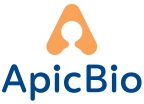Apic Bio, Inc., an innovative gene therapy company developing novel treatment options for patients with rare genetic diseases, today announced that the U.S. Food and Drug Administration (FDA) has cleared its Investigational New Drug (IND) application for APB-102, the Company’s lead gene therapy candidate designed to treat SOD1 amyotrophic lateral sclerosis (ALS) - the most common cause of familial ALS.

CAMBRIDGE, Mass.--(BUSINESS WIRE)-- Apic Bio, Inc., an innovative gene therapy company developing novel treatment options for patients with rare genetic diseases, today announced that the U.S. Food and Drug Administration (FDA) has cleared its Investigational New Drug (IND) application for APB-102, the Company’s lead gene therapy candidate designed to treat SOD1 amyotrophic lateral sclerosis (ALS) - the most common cause of familial ALS.
“FDA IND clearance for our drug candidate APB-102 to treat SOD1 ALS is a significant milestone for Apic Bio and takes us one step closer to bringing potentially disease-modifying therapies to patients with genetic diseases,” said John Reilly, Chief Executive Officer and Co-founder of Apic Bio.
“Our steadfast commitment to patients and their families drives everything we do at Apic Bio,” added Dr. Jorge Quiroz, EVP and Chief Medical Officer of Apic Bio. “ALS is a devastating, fatal neurogenerative disorder, where mutations in the SOD1 gene account for one-fifth of all inherited forms of the disease. We believe that APB-102 may provide therapeutic benefit for these patients by targeting the underlying pathophysiology of the disease.”
“The clinical development of APB-102 is rooted in nearly 30 years of gene therapy research demonstrating the link between the SOD1 gene mutation and ALS and the strong potential of AAV-delivered SOD1 targeting miRNA to slow down or reverse the progression of ALS in patients with SOD1 mutations,” said Robert Brown, DPhil, MD, Professor of Neurology at the University of Massachusetts Medical School and Scientific Co-Founder of Apic Bio. Dr. Brown was a lead member of the team that discovered SOD1 as the first genetic mutation linked to ALS. “Despite SOD1 gene mutations being well understood as a cause of genetic ALS for decades, we don’t yet have an approved treatment option that targets the disorder at the source. I am pleased to see APB-102 progress as Apic Bio aims to develop a meaningful, long-term disease modifying gene therapy option for patients.”
APB-102 is designed to slow or reverse progression of SOD1 ALS through a next generation recombinant adeno-associated virus (AAV) capsid and micro ribonucleic acid (miRNA) vector construct which has been shown in preclinical proof of concept studies to suppress activity of the mutated SOD1 gene.
The Phase 1/2 clinical trial which will be initiated in late 2021/early 2022 is a multi-center, three-part study to evaluate the safety, tolerability, and efficacy of intrathecally administered APB-102 in patients with SOD1 ALS mutations: part I, single ascending dose; part II, randomized, double-blind, placebo-controlled; and part III, extended follow-up.
About SOD1 ALS
Amyotrophic lateral sclerosis (ALS) is a fatal neurodegenerative disorder characterized by loss of motor neurons, leading to muscle weakness and eventual paralysis. Most patients face mortality within five years of disease onset due to respiratory failure. ALS can be caused by multiple genetic mutations and can be sporadic or familial. Approximately ten percent of ALS cases have a known genetic driver; of those, approximately twenty percent are linked to a mutation in the SOD1 gene that codes for the enzyme superoxide dismutase 1. Current approved ALS treatments only delay disease progression without addressing the underlying genetic causes of the disease.
About APB-102
APB-102 is a gene therapy candidate being evaluated for the potential treatment of SOD1 ALS. APB-102 is a recombinant AAVrh10 vector that expresses an anti-SOD1 microRNA. The microRNA binds to SOD1 mRNA thereby reducing production of the protein which is mutant in patients with this form of the disease. Reducing SOD1 protein levels may improve survival and function of motor neurons and potentially provide a therapeutic benefit to people with SOD1 induced ALS. APB-102 has received orphan drug designation from the U.S. Food and Drug Administration.
About Apic Bio
Apic Bio is an innovative gene therapy company focused on developing first-in-class treatment options for rare, undertreated neurological and liver diseases. The Company’s lead program is an adeno-associated (AAV)-based gene therapy for the treatment of SOD1 ALS. Preclinical studies of additional genetic forms of ALS (C9Orf72) and Alpha-1 Antitrypsin Deficiency (Alpha-1) are ongoing. The Company is also advancing discovery programs for two undisclosed CNS indications that leverage its proprietary silence and replace THRIVE™ platform. The Company is backed by leading and disease-centric investors, including Morningside Ventures, ALS Investment Fund, and The Alpha-1 Project (TAP). For more information please visit www.apic-bio.com.
View source version on businesswire.com: https://www.businesswire.com/news/home/20210421005318/en/
Contacts
Media:
David Rosen
david.rosen@argotpartners.com
646.461.6387
Investor Relations:
Joseph Rayne
Joseph@argotpartners.com
617.340.6075
Source: Apic Bio, Inc.





